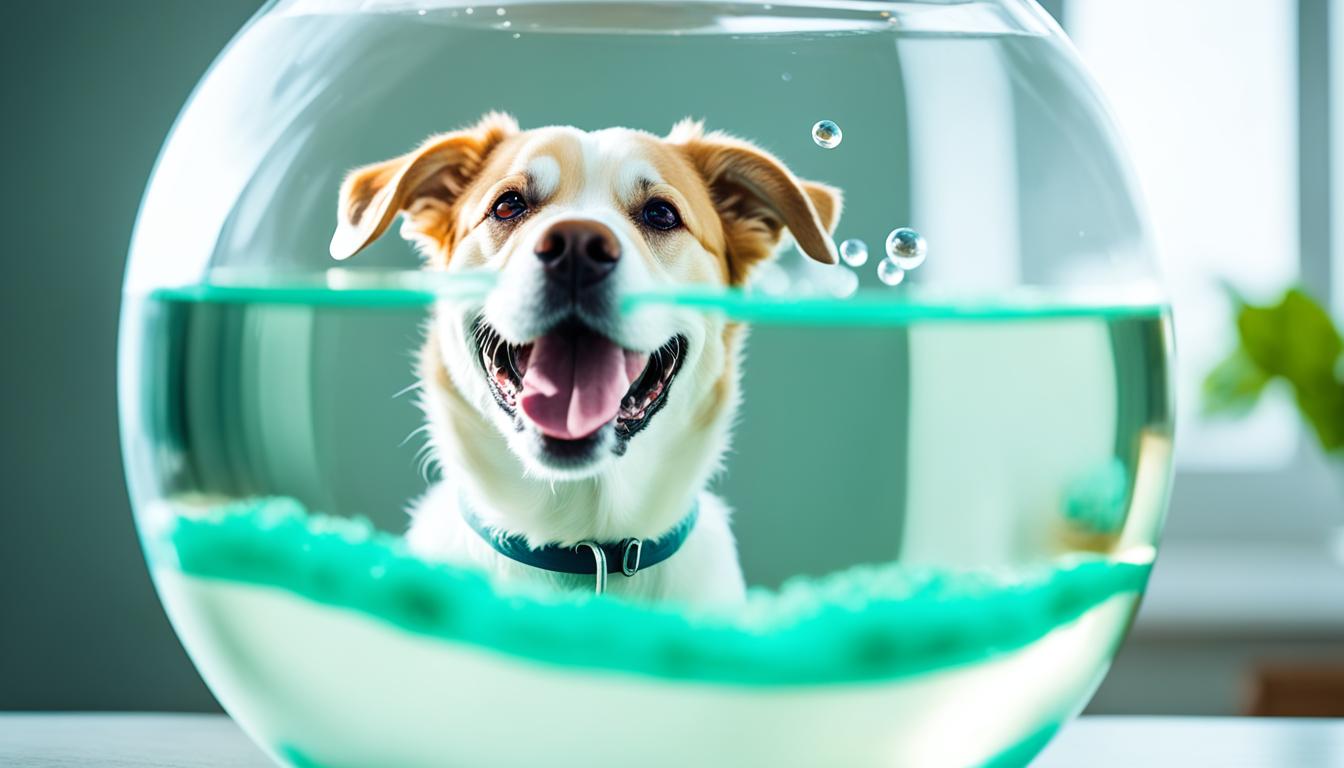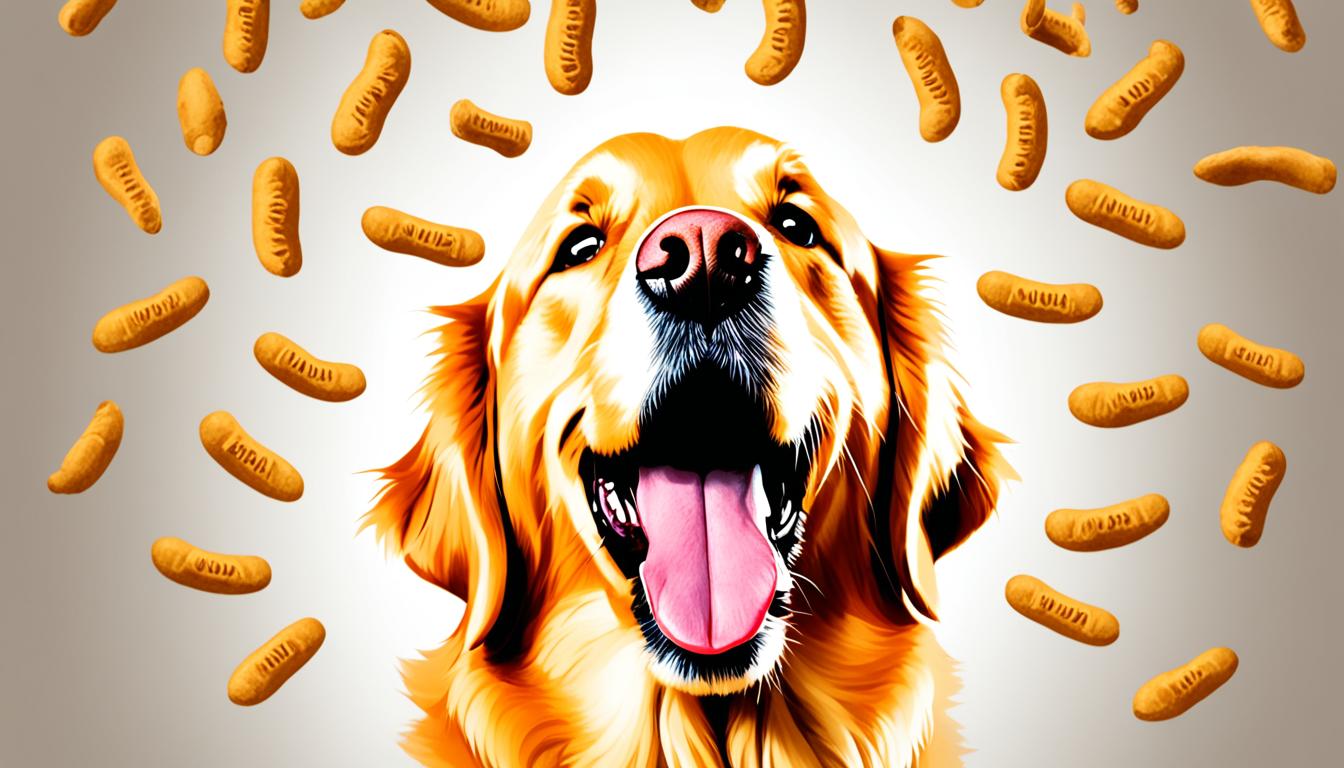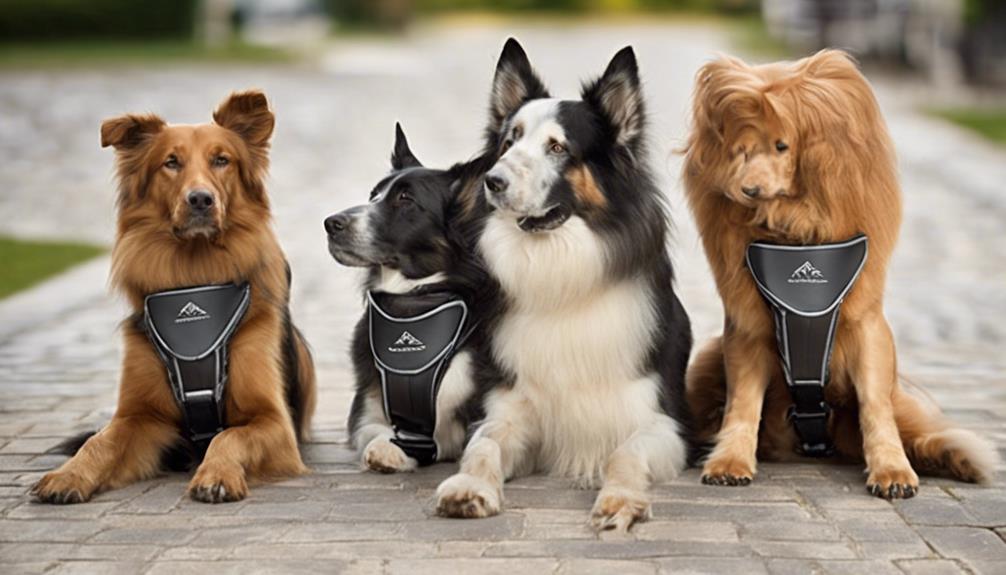Did you know that some dogs have breath that smells like fish? It may sound strange, but this phenomenon is actually quite common among our furry friends. If you’ve ever wondered why your dog’s breath has a fishy odor, you’re not alone. This article will explore the causes of bad breath in dogs and provide helpful tips for addressing this issue.
Key Takeaways:
- Bad breath in dogs can be caused by poor dental hygiene, dietary issues, or underlying health conditions.
- Regular dental care is crucial for maintaining fresh breath and preventing the buildup of plaque and tartar.
- Certain characteristics of your dog’s bad breath may indicate underlying health problems that require veterinary care.
- Cooper & Gracie offers effective solutions for freshening your dog’s breath and promoting oral health.
- By taking proper care of your dog’s dental hygiene and addressing any underlying health issues, you can ensure that your pet has fresh breath and a healthier mouth.
Common Causes of Bad Breath in Dogs
Bad breath in dogs can be attributed to various factors, with poor dental hygiene being the most common cause. When dogs fail to receive regular dental care, it can lead to a buildup of plaque and tartar in their mouths, resulting in bacterial growth and a stronger odor. Maintaining good dental hygiene is essential to combat this issue.
In addition to poor dental hygiene, dietary issues can also contribute to bad breath in dogs. Dogs consuming feces or certain foods with strong odors may experience an unpleasant breath. It’s important for pet owners to be mindful of their dog’s diet and address any dietary issues that may be causing bad breath.
Furthermore, underlying health conditions can play a role in a dog’s bad breath. Diabetes, kidney problems, and liver disease are among the health conditions that can contribute to unpleasant breath in dogs. If a pet owner suspects that their dog’s bad breath is a result of an underlying health issue, seeking veterinary care is crucial for proper diagnosis and treatment.
In summary, the common causes of bad breath in dogs include poor dental hygiene, dietary issues, and underlying health conditions such as diabetes, kidney problems, and liver disease. Understanding these causes can help pet owners take the necessary steps to address and alleviate their dog’s bad breath.
Preventing Poor Dental Hygiene in Dogs
One effective way to prevent poor dental hygiene in dogs is regular dental care. This includes brushing their teeth regularly using dog-friendly toothpaste and a toothbrush or dental wipes. Additionally, providing them with appropriate dental chews or toys can help clean their teeth and reduce plaque buildup. Regular dental check-ups with a veterinarian are also essential to ensure optimal dental health for dogs.
| Cause of Bad Breath | Description |
|---|---|
| Poor Dental Hygiene | Buildup of plaque and tartar leads to bacterial growth and odor |
| Dietary Issues | Consuming feces or certain foods with strong odors |
| Underlying Health Conditions | Diabetes, kidney problems, liver disease |
When to Worry About Fishy Dog Breath
While bad breath in dogs is often a result of poor dental hygiene or dietary issues, it’s important for pet owners to be aware of signs that may indicate underlying health problems. Certain characteristics of bad breath, such as a sweet smell or accompanying symptoms like a loss of appetite or vomiting, can be indications of more serious health issues in dogs.
Signs of Underlying Health Issues in Dogs
When your dog’s breath smells fishy and exhibits the following signs, it’s essential to seek veterinary care:
- Sweet odor: A fruity or sweet smell to your dog’s breath could be a sign of diabetes. Just like humans, dogs can develop diabetes, and bad breath can be one of the early symptoms.
- Loss of appetite: If your dog suddenly loses interest in food and accompanies it with bad breath, it may be a sign of an underlying health problem. Loss of appetite can be an indication of issues like oral injuries or gastrointestinal problems.
- Vomiting: Persistent or recurrent vomiting combined with foul-smelling breath can indicate significant health concerns. It may be a sign of liver disease, which can cause a distinct odor in your dog’s breath.
When to Seek Veterinary Care for Bad Breath in Dogs
If you notice any of the above signs or if your dog’s bad breath persists despite proper dental hygiene and dietary adjustments, it’s crucial to consult your veterinarian. They will be able to evaluate your dog’s overall health and determine if there are any underlying conditions contributing to the fishy odor in their breath.
Remember, your veterinarian is the best resource for diagnosing and treating any potential health issues. Seek their guidance to ensure your furry friend receives the necessary care and treatment for their specific condition.
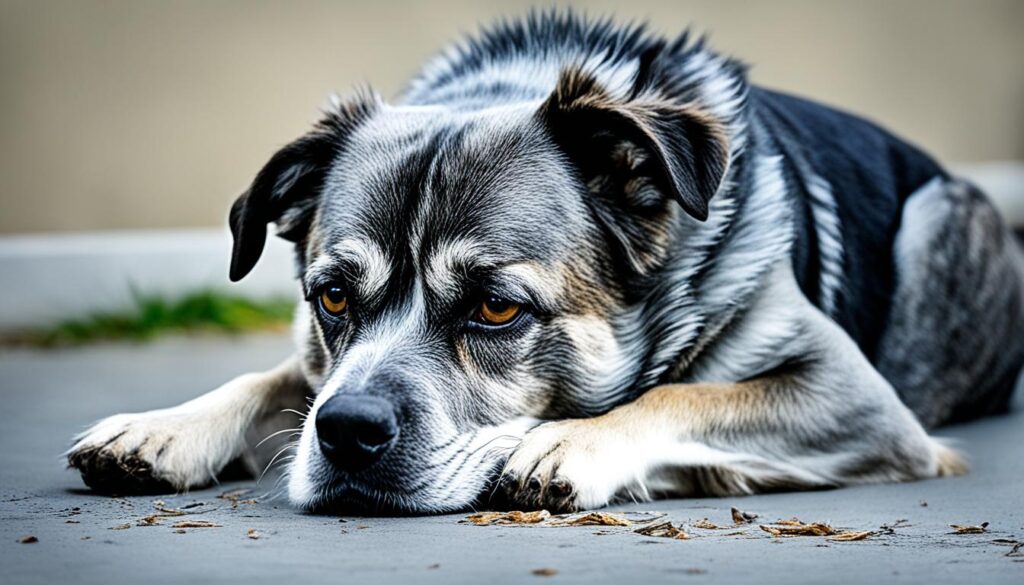
| Signs of Underlying Health Issues in Dogs | When to Seek Veterinary Care for Bad Breath in Dogs |
|---|---|
| Sweet odor | Loss of appetite |
| Loss of appetite | Vomiting |
| Vomiting | Persistent or recurrent vomiting combined with foul-smelling breath can indicate significant health concerns. It may be a sign of liver disease, which can cause a distinct odor in your dog’s breath. |
Tips for Treating Your Dog’s Bad Breath
The treatment for bad breath in dogs can vary depending on the underlying cause. It’s important to address the root issue to effectively freshen your furry friend’s breath. Here are some tips and recommendations to help you treat your dog’s bad breath and improve their dental health.
Dental Care for Dogs
One of the most common causes of bad breath in dogs is poor dental hygiene. Just like humans, dogs need regular dental care to maintain oral health. Here are some dental care practices you can implement:
- Brush your dog’s teeth: Use a dog-specific toothbrush and toothpaste to brush your dog’s teeth regularly. Start slowly and gradually increase the duration of brushings.
- Provide dental treats: Give your dog dental treats or dental chews that promote oral health and help control plaque and tartar buildup.
- Use dental water additives: Consider adding a dental water additive to your dog’s water bowl to inhibit bacterial growth and freshen their breath.
Regular dental cleanings are also essential for maintaining your dog’s dental health. Consult with your veterinarian about scheduling professional dental cleanings to remove plaque and tartar.
Treating Underlying Health Conditions
In some cases, bad breath in dogs can be a symptom of underlying health conditions. If your dog’s bad breath persists despite dental care efforts, it’s important to consult with your veterinarian for a proper diagnosis. Treating the underlying health condition may help improve your dog’s breath. Common health conditions associated with bad breath in dogs include:
- Diabetes: Proper management of diabetes can help improve your dog’s breath. Follow your veterinarian’s instructions for managing diabetes and monitor your dog’s blood sugar levels.
- Liver disease: Treating liver disease can have a positive impact on your dog’s breath. Your veterinarian will recommend appropriate treatment options based on the severity of the condition.
Working closely with your veterinarian is key to addressing any underlying health conditions that contribute to your dog’s bad breath.
By taking a proactive approach to your dog’s dental care and addressing any underlying health issues, you can effectively treat their bad breath and promote overall oral health.
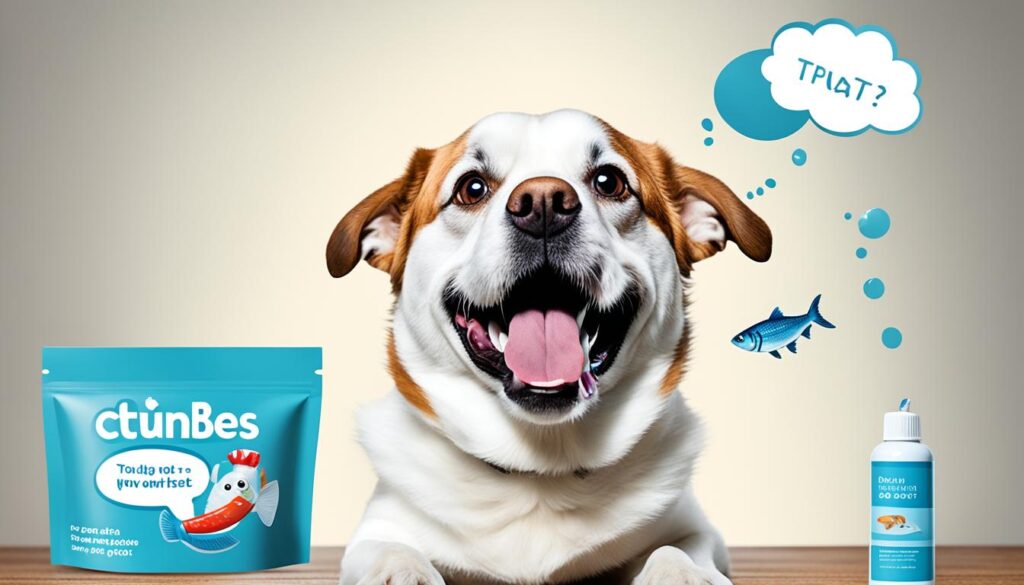
Cooper & Gracie’s Solutions for Fresh Breath
Cooper & Gracie understands the importance of fresh breath for your beloved furry friend. They offer a range of exceptional products designed to combat bad breath and promote oral health in dogs. With their innovative solutions, you can ensure that your dog’s breath is fresh and enjoyable.
1. Breath Freshener Water Additive
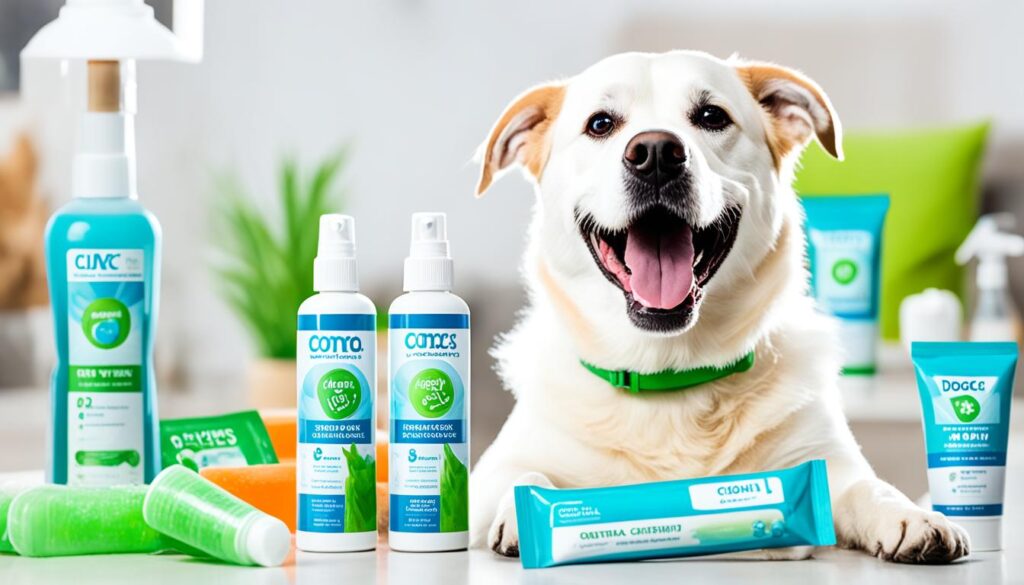
Cooper & Gracie’s Breath Freshener Water Additive is a natural remedy that tackles the root cause of bad breath – plaque and tartar buildup. By simply adding this additive to your dog’s water bowl, you can combat bacteria growth, reduce the chances of dental issues, and improve breath freshness. It’s an effortless way to ensure your dog’s oral health is maintained while keeping their breath fresh.
2. Plaque Dental Powder
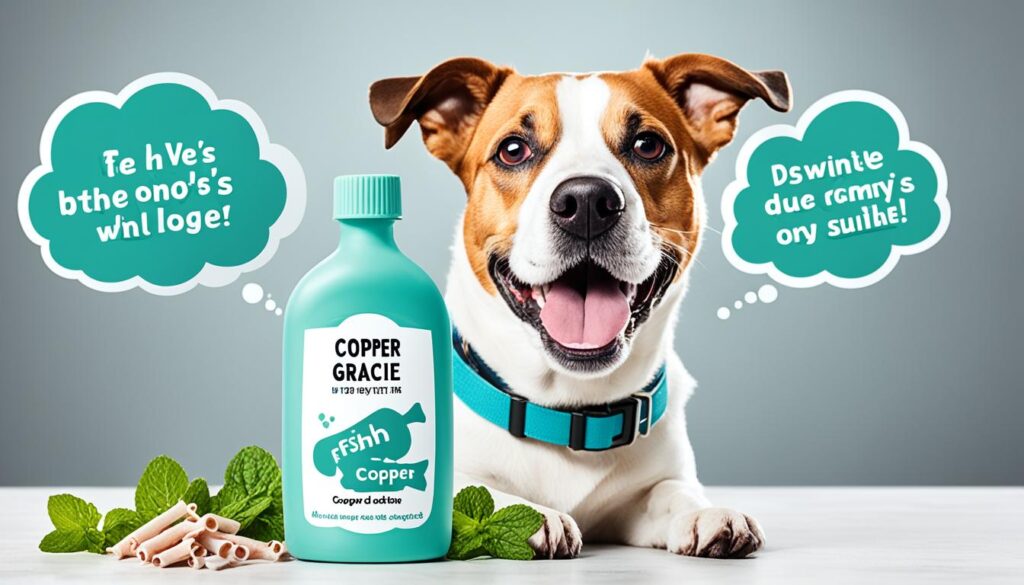
Cooper & Gracie’s Plaque Dental Powder is another effective solution for freshening your dog’s breath. This powder can be sprinkled on your dog’s food, making it convenient and easy to use. This unique formula helps reduce plaque buildup, keeping your dog’s teeth clean and breath fresh. Incorporating the Plaque Dental Powder into your dog’s dental care routine will aid in maintaining their oral hygiene.
With Cooper & Gracie’s range of products, you can effectively tackle bad breath and prioritize your dog’s dental care. These specially formulated solutions are designed to promote oral health and improve breath freshness. Give your dog the gift of fresh breath with Cooper & Gracie’s exceptional dog products.
Conclusion
Addressing bad breath in dogs is crucial for the overall health and well-being of your pet. Understanding the common causes, such as poor dental hygiene and dietary issues, empowers pet owners to take proactive steps in improving their dog’s breath. Regular dental care, including both professional cleanings and at-home brushing, combined with a nutritious diet, plays a vital role in maintaining oral hygiene and ensuring fresh breath for dogs.
When it comes to freshening your dog’s breath and promoting excellent dental health, Cooper & Gracie offers effective solutions. Their range of products, including the Breath Freshener Water Additive and the Plaque Dental Powder, are specifically designed to combat plaque and tartar buildup in your dog’s mouth. These products are an excellent addition to your dog’s dental care routine, helping maintain oral hygiene and keeping your furry friend’s breath fresh.
By giving your dog the proper care and attention they need, you can be confident in ensuring fresh and enjoyable breath for both you and your loyal companion. Don’t wait to take action – prioritize your dog’s dental health and maintain their oral hygiene today.
